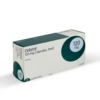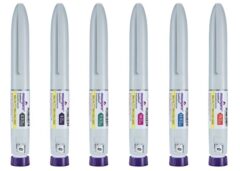Buy Weight Loss Injection
GLP-1 Pen is a new weight-loss treatment, designed to make you feel less hungry.
GLP-1 Pen contains the active ingredient that is GLP-1 based, and is prescribed for adults with obesity. It was approved in the USA in 2021, and was made available in the UK in September 2023.
Summary
| Dose | Inject ONCE weekly, following the dose-escalation schedule |
|---|---|
| Type of medicine | Appetite-suppressant – GLP-1 receptor agonist |
| Mechanism | Suppresses appetite and promotes feeling full for longer, decreasing food intake. |
| Active Ingredient | Samagalutide |
| Name | GLP-1 Pen |
| Side Effects | Can include nausea, diarrhoea, constipation, abdominal pain, vomiting |
What is GLP-1 Pen?
GLP-1 Penis a weight loss injection that can be an effective aid to weight-loss when used alongside a reduced-calorie diet and increased exercise. The weight loss drug contains the active ingredient that is GLP-1. Unlike other weight loss shots, GLP-1 Pen is injected once a week and can be used by adults with a body mass index (BMI) over 30. It can also be used by people with a BMI over 27 with weight-related conditions (such as high blood pressure or type 2 diabetes). The active ingredient, GLP-1, is currently licensed in the UK as a type 2 diabetes treatment under the brand name Ozempic and Rybelsus. Ozempic isn’t licensed as a weight loss medication in the UK, but GLP-1 Pen is licensed for weight loss with a specific weight loss dosing and formulation.
How Does it Work?
The active ingredient, GLP-1, is a type of medicine called a GLP-1 receptor agonist. This means it mimics a hormone produced by the body called glucagon like peptide 1 (GLP-1). This hormone plays an important role in regulating appetite (the feeling of fullness).
By mimicking this hormone, the GLP-1 Pen shot acts on receptors in the brain that control your appetite. It causes you to feel fuller and less hungry, leading to less craving for food. This can be combined with a calorie-controlled diet and increased physical activity to lose weight.
How to Take GLP-1 Pen
The GLP-1 Pen dose is increased every 4 weeks for 16 weeks. This means that patients take a 0.25mg once weekly dose for the first 4 weeks and gradually increase it until they reach the maintenance dose of 2.4 mg once weekly from week 17 onwards. This gradual increase is important because it minimises the risk of side effects. If side effects do occur, most will be experienced during the dose-escalation phase before improving.
GLP-1 Pen should be injected once a week on the same day each week. It can be taken at any time of day and can be taken with or without meals. It should be injected subcutaneously into the abdomen, thigh or upper arm.
Is GLP-1 Pen Effective for Weight Loss?
Clinical trials have shown that GLP-1 Pen treatment resulted in a statistically significant reduction in body weight compared to placebo after 68 weeks. One trial showed that people taking GLP-1 Pen had a mean change in body weight of 14.9% compared to 2.4% in the placebo group.
The results also showed that, after 68 weeks, 83.5% of patients lost 5% or more of their body weight. In the placebo group, 31.1% of patients lost 5% or more of their body weight. Another clinical trial also showed a statistically significant reduction in body weight vs placebo.
The National Institute for Health and Care Excellence (NICE) has recommended GLP-1 Pen for weight management for those living with obesity due to the highly positive trial results.
GLP-1 Pen Contraindications & Drug Interactions
This medicine is not suitable for anyone who has had an allergic reaction to GLP-1 or any of the other ingredients in the injection.
GLP-1 Pen can cause digestive system side effects like vomiting and diarrhoea. These side effects can increase the risk of dehydration, so you should make sure that you drink enough fluids. This is even more important for people with kidney problems.
An uncommon side effect that may be experienced is pancreatitis. If you notice any symptoms of pancreatitis, such as severe stomach pain, stop using GLP-1 Pen and see a doctor straight away. You can read more about pancreatitis symptoms on the NHS website.
People with diabetes should not use GLP-1 Pen as a substitute for insulin. It can also increase the risk of getting low blood sugar levels when taken with other diabetic medicines. See section 2 of the patient information leaflet for a full list of warnings.
This medication is not suitable for anyone experiencing diabetic retinopathy. Speak to your doctor before using GLP-1 Pen if this applied to you.
GLP-1 Pen and Pregnancy
It should not be used in pregnancy because it may harm the foetus. GLP-1 Pen should be stopped at least 2 months before a planned pregnancy. You should not use this medicine if you are breastfeeding.
GLP-1 Pen Side Effects
As with all medicines, some people may experience side effects from the treatment. Not everyone will get them and a majority will be mild. Only 5.3% of patients in one clinical trial stopped GLP-1 Pen due to side effects. The most common GLP-1 Pen side effects are headache, vomiting, diarrhoea, constipation, nausea, abdominal pain, and fatigue. These side effects usually improve over time as your body gets used to the medicine. Gradually increasing the dose every 4 weeks helps to reduce the risk of experiencing these side effects. If you find your side effects are severe or aren’t improving, ask your doctor or pharmacist for advice. See section 4 of the patient information leaflet for a complete list of possible side effects.
FAQ
Is GLP-1 Pen the same as Ozempic?
Yes, GLP-1 Pen contains exactly the same active ingredient as Ozempic, and is made by the same manufacturer. The main difference is Ozempic is licensed for diabetes, while GLP-1 Pen is licensed for weight loss.
What is GLP-1 Pen used for?
GLP-1 Pen is used as a weight-loss treatment in people with a BMI over 30 or a BMI over 27 with weight-related conditions like high blood pressure. It’s used to lose weight alongside a calorie-restricted diet and increased physical exercise.
Is GLP-1 Pen available over the counter?
No, GLP-1 Pen is a prescription medication for weight loss for those with a BMI over 30. Consult a doctor online or in person to discuss eligibility for weight loss treatments.











All good!